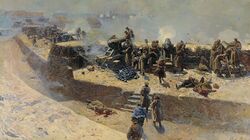Andamonian First Republic: Difference between revisions
mNo edit summary |
m (1 revision imported) |
(No difference)
| |
Revision as of 18:32, 28 January 2019
Andamonian First Republic Tlahiylotl Ahandémozi | |||||||||
|---|---|---|---|---|---|---|---|---|---|
| 1844–1892 | |||||||||
|
Flag | |||||||||
| Capital | Zadé Axochizin | ||||||||
| Government | Federal republic | ||||||||
| President | |||||||||
• 1844-1847 | Rahaca Kahuotzi | ||||||||
• 1888-1892 | Tixuhel Darandae | ||||||||
| History | |||||||||
• Established | 5 September 1844 | ||||||||
• Disestablished | 19 October 1892 | ||||||||
| |||||||||
| Today part of | |||||||||
The Andamonian First Republic, officially the Andamonian Republic (Andamonian: Tlahiylotl Ahandémozi), governed Andamonia from 1844 until 1892. It had its capital at Zadé Axochizin. It took power after the Andamonian Revolution deposed the ruling Tlacapila dynasty, which fled to Exponent, and remained in power until spillover from the Trellinese Civil War provoked rebellion throughout the country.
In comparison to its predecessor, the First Republic was a liberal and progressive state. It introduced numerous social reforms in its first two decades under a series of populist presidents, but by 1871 had begun to stagnate. An attempted solution was found in the Baira Debacle, a war the republic provoked against Txekrikar, but when it ended in failure popular support petered out.
History
Formation
In February 1844, Cueytatzl Ren I issued an empire-wide edict of taxation. It was met with considerable hostility in the coastal provinces of Andamonia, as its provisions levied separate taxes on both landowners and boat-owners and therefore were doubled on much of the maritime region's population. On 18 February, the fishermen of the Tlatleyo province marched on Cevrazu and held a mass protest, which came to be known as the Pearl Fishers' Revolt despite being a peaceful demonstration. Over the following weeks, successive protests by fishermen and other groups became increasingly agitated and by 13 March had descended into violence in several cities of the empire.
The Adamantine Society of Cevrazu, ostensibly a gentlemen's club but in practice a republican society, began organising public debates on the topics of taxation, conscription and absolutism. Seditious sentiment spread rapidly and the Adamantists found themselves connected to a number of armed militias. On 8 April they declared the emperor to be unrepresentative of the Andamonian people and, nominating Rahaca Kahuotzi to lead them, officially began the Andamonian Revolution, no longer a string of loosely connected taxation protests but a concerted attempt to overthrow the monarchy.
Kahuotzi was appointed Commander-in-Chief of the revolutionary army, created out of the various militias. It won a string of minor tactical victories in the north of the empire, and on 3 September routed the greater part of the imperial army in the Battle of Makami. As Kahuotzi marched on Zadé Axochizin, the imperial family fled the country. Two days later, the Adamantists proclaimed the Andamonian Republic and announced an election planned for 13 September.
Later history

In the 1871 presidential election, candidate Muriaz Raihanri captured popular favour when he promised a short and successful war against Txekrikar. Once elected, he proved hesitant in declaring war, and ultimately it was the provocation of his government that led Txekrikar to declare war on Andamonia instead. The resulting engagement was fought in a period of nationalist fervour between 1872 and 1875 and came to be known as the Baira Debacle as, despite impressive initial gains and major engagements such as the Siege of Belziroa, it ended with a return to the status quo. After the war, public support for the republic dropped off sharply.
In 1892, after the outbreak of the Trellinese Civil War, the government was divided on how to respond, and as a backlash to Trellin's anti-monarchist sentiment there were calls for the Tlacapila dynasty to return from exile. Unable to reconcile, the government collapsed in October and a period of civil war began. A successor government was only formed the following February, beginning the Second Republic.

